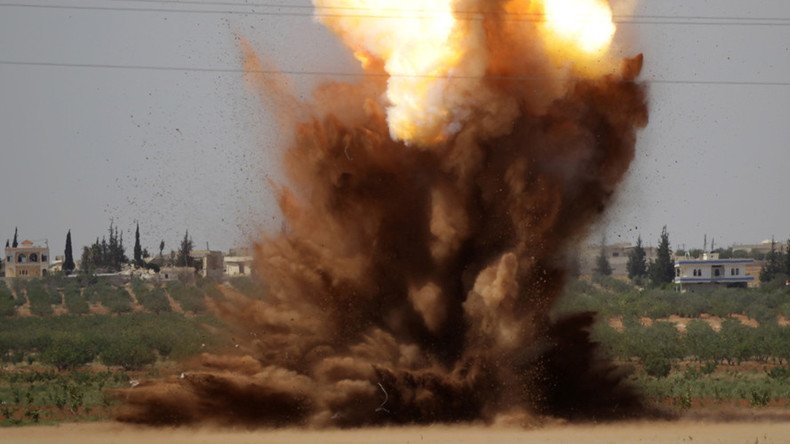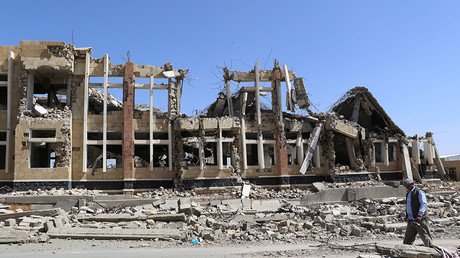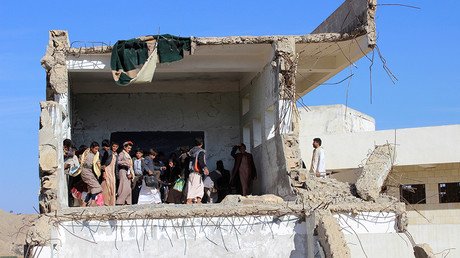European, Japanese & Canadian firms fund production of cluster bombs in breach of intl law – report

More than a dozen financial companies based in European states, Japan, and Canada invest in major cluster bomb producers, in violation of an international treaty prohibiting their production that has been ratified by their home countries, a report says.
Investment in companies that produce cluster bombs continues to grow despite an international agreement banning the use and production of such munitions that has been signed by more than 100 nations to date, a Netherlands-based NGO called PAX noted in its latest report on the issue.
Over the past four years, the total volume of investment in cluster bomb producers amounted to $31 billion, while the total number of investors reached 166 financial institutions, the report published on Tuesday says.
Investment sharply increased between 2016 and 2017, jumping by $3 billion.
Cluster bombs are banned under the Convention on Cluster Munitions (CCM), an international treaty adopted on May 30, 2008, which entered into force on August 1, 2010. So far, it has been signed by 119 countries, of which 101 have ratified it. Madagascar became the 101st nation to ratify the CCM on May 20.
The convention explicitly prohibits the use, production, transfer, or stockpiling of cluster munitions, as well as facilitating any of those activities.
Cluster munitions, which are dropped by air or fired by artillery, scatter hundreds of explosive submunitions, or bomblets, across a wide area, causing indiscriminate damage. The bomblets often remain unexploded on or in the ground, where they can kill or cripple civilians long after being dropped.
The PAX report, entitled ‘Worldwide Investments in Cluster Munitions; a shared responsibility’, examined investments in six major cluster bomb manufacturers: US companies Orbital ATK and Textron, as well as China’s Norinco and China Aerospace Science and Industry, and South Korea’s Hanwha and Poongsan.
The NGO found that most investors are not from countries that signed the CCM, with 85 of 166 from the US. As many as 30 financial institutions that fund cluster bomb production are located in China and another 27 are based in South Korea.
However, PAX also discovered that 15 corporate investors are based in countries that did sign the CCM. This list includes four Japanese companies, as well as three British and three Canadian firms, with the rest from France, Germany, Spain, and Switzerland.
Japan’s Mitsubishi UFJ Financial Group (MUFG), one of the world’s largest comprehensive financial groups, which operates in 50 countries and controls $2.6 trillion in assets, is also in the top ten companies investing in cluster bomb producers, according to the PAX report.
The MUFG, which invested a total of $914 million into cluster bomb producing companies over four years, is also one of the top five loan and banking service providers for cluster bomb manufacturers.
“Cluster bombs are banned and would not be produced without funding… How can blue chip banks continue to invest in producers of such horrendous and banned weapons – do they simply not care?" PAX program officer Maaike Beenes said, urging financial institutions “to take responsibility with more ethical investments.”
His words were echoed by Firoz Alizada, a spokesperson for the Cluster Munition Coalition, an international network of NGOs actively campaigning to eradicate cluster munitions. “Cluster bombs are banned for a clear reason, because they disproportionately harm civilians,” Alizada said, as cited by Reuters.
“That is why no banks or financial institutions should put a penny in companies that produce these illegal and harmful weapons, and no company or country should produce cluster munitions,” he added.
The Japanese companies mentioned in the PAX report refused to comment on “individual transactions” involving investment or loans for companies involved in cluster bomb production, the Japanese Asahi Shimbun daily reports.
In the meantime, Motoko Mekata, a professor at Chuo University and the director of the Japan Campaign to Ban Landmines (JCBL), said that the “financial institutions will be criticized as lacking ethics if they continue to be involved in cluster bomb makers by making narrow interpretations that they can invest in or extend loans to businesses that are not directly related to cluster bomb manufacturing,” Asahi Shimbun reports.
The issue of cluster munitions has recently come into the public spotlight in connection with the situation in Yemen, where a Saudi-led coalition continues to wage an aerial campaign against Shiite Houthi rebels in order to restore the ousted government of Sunni President Abd-Rabbu Mansour Hadi.
According to UN estimates, up to 10,000 people have been killed in the fighting so far, including 4,000 civilians. According to the UN, the majority of civilian deaths have resulted from airstrikes conducted by the Saudi-led coalition, which has repeatedly been accused of using cluster bombs.
In December of 2016, Human Rights Watch accused the coalition led by the Saudi Arabia, which has not signed the CCM, of using Brazilian-made surface-to-surface rockets containing banned cluster munitions in strikes that hit two schools in northern Yemen. Similar accusations were made earlier by Amnesty International.















